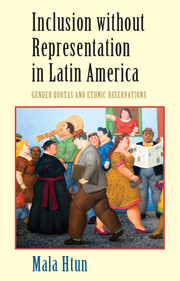Book contents
- Frontmatter
- Dedication
- Contents
- List of Tables and Figures
- Preface and Acknowledgments
- List of Acronyms
- 1 Introduction: Politics of Inclusion in Latin America
- 2 Women, Afrodescendants, and Indigenous Peoples in Elected Office
- 3 Gender Quotas: Why and How?
- 4 Indigenous Reservations and Gender Parity in Bolivia (written with Juan Pablo Ossa)
- 5 Political Inclusion in Colombia
- 6 Brazil: Combatting Exclusion through Quotas in Higher Education
- 7 After Quotas: Women's Presence and Legislative Behavior in Argentina (written with Marina Lacalle and Juan Pablo Micozzi)
- 8 Conclusion
- Appendix 1 Research Trips
- Appendix 2 Mechanisms of Inclusion
- References
- Index
1 - Introduction: Politics of Inclusion in Latin America
Published online by Cambridge University Press: 18 December 2015
- Frontmatter
- Dedication
- Contents
- List of Tables and Figures
- Preface and Acknowledgments
- List of Acronyms
- 1 Introduction: Politics of Inclusion in Latin America
- 2 Women, Afrodescendants, and Indigenous Peoples in Elected Office
- 3 Gender Quotas: Why and How?
- 4 Indigenous Reservations and Gender Parity in Bolivia (written with Juan Pablo Ossa)
- 5 Political Inclusion in Colombia
- 6 Brazil: Combatting Exclusion through Quotas in Higher Education
- 7 After Quotas: Women's Presence and Legislative Behavior in Argentina (written with Marina Lacalle and Juan Pablo Micozzi)
- 8 Conclusion
- Appendix 1 Research Trips
- Appendix 2 Mechanisms of Inclusion
- References
- Index
Summary
Political exclusion has been pervasive in Latin America. Portraits of fair-skinned men cover the walls of government buildings. Women, Afrodescendants, and indigenous peoples are scarcely seen in these portraits and barely present in the diplomatic corps, heads of government agencies, and, until recently, in national legislative chambers. Beginning in the last decade of the twentieth century, governments in more than a dozen countries modified political institutions to promote greater inclusion of members of social groups defined by gender, race, ethnicity, or a combination of these criteria (see Table 1.1). Between 1991 and 2013, fifteen Latin American governments approved national laws requiring political parties to nominate a minimum number of women as candidates in popular elections. Bolivia, Colombia, and Venezuela created small numbers of reserved legislative seats for indigenous peoples (and Colombia did the same for “black communities”), Peru required parties to include indigenous candidates on their lists in local elections in the Amazonian region, and Mexico engineered some two dozen single-member districts around areas where indigenous voters were a majority. Meanwhile, scores of Brazilian universities introduced admissions quotas by race and class, prompting the government to adopt a national law in 2012 imposing such quotas on the entire federal university system.
Official efforts to promote inclusion were informed by claims of organizations advocating the rights of historically excluded groups. The second wave of feminist movements mobilized across the region in the 1970s, 1980s, and 1990s to demand an end to violence and discrimination, an expansion of social policies, and access to political power (Alvarez, 1990; Baldez, 2002; Jaquette, 1994). In the Andes, Mexico, and Central America, groups foregrounded an indigenous political identity to demand recognition, autonomy, land, and presence in political decision making (Jung, 2008; Lucero, 2008; Yashar, 2005). Black movements challenged racism, entrenched inequalities, and the ways that national ideologies of mixture hid, and diluted, Afrodescendant identity (Caldwell, 2007; Hanchard, 1994; Paschel, 2010; Rahier, 2012).
At the same time, an emerging global discourse connected democratic legitimacy to social diversity in decision-making bodies. The Beijing Platform for Action, endorsed by 150 world governments in 1995, including 19 in Latin America, recommended that states take “positive action” to achieve equal representation of women and men in all governmental and public administration positions (United Nations, Report of the Fourth World Conference on Women, 1996).
- Type
- Chapter
- Information
- Inclusion without Representation in Latin AmericaGender Quotas and Ethnic Reservations, pp. 1 - 19Publisher: Cambridge University PressPrint publication year: 2016



